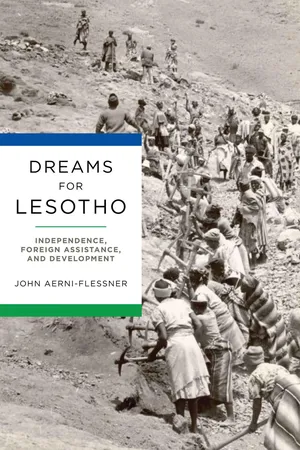![]()
NOTES
Introduction
1. Those who reside in Lesotho are collectively Basotho. The singular is Mosotho. Lesotho translates directly as “the land of the Sotho,” and Basotho have referred to the land by this term since the nineteenth century. This book respects that usage and uses the colonial name Basutoland only when making explicit reference to the colonial government. The first language of most Basotho is Sesotho.
2. Interview, Thabelo Kebise, Maseru Bus Stop, April 1, 2008.
3. James Ferguson, The Anti-Politics Machine: “Development,” Depoliticization, and Bureaucratic Power in Lesotho (New York: Cambridge University Press, 1990), 3–8.
4. Ibid., xiv.
5. Frederick Cooper, Africa since 1940: The Presence of the Past (Cambridge: Cambridge University Press, 2002).
6. John Aerni-Flessner, “Development, Politics, and the Centralization of State Power in Lesotho, 1960–1975,” Journal of African History 55, no. 3 (2014): 401–21.
7. Charles Piot, Nostalgia for the Future: West Africa after the Cold War (Chicago: University of Chicago Press, 2010), 20.
8. Robert M. Ahearne, “Development and Progress as Historical Phenomenon in Tanzania: ‘Maendeleo? We Had That in the Past,’” African Studies Review 59, no. 1 (2016): 83; J. S. Hogendorn and K. M. Scott, “The East African Groundnut Scheme: Lessons of a Large-Scale Agricultural Failure,” African Economic History 10 (1981): 81–115.
9. They were either unwilling or unable to acknowledge that Judith Van Allen’s concept “bad future things” was possible and that rural Basotho could conceive of these outcomes as well as see the positive vision. Judith Van Allen, “‘Bad Future Things’ and Liberatory Moments: Capitalism, Gender and the State in Botswana,” Radical History Review 76 (2000): 136–68.
10. Frederick Cooper, “Writing the History of Development,” Journal of Modern European History 8, no. 1 (2010): 10.
11. Joey Power, Political Culture and Nationalism in Malawi: Building Kwacha (Rochester, NY: Rochester University Press, 2010); Susan Geiger, TANU Women: Gender and Culture in the Making of Tanganyikan Nationalism, 1955–1965 (Portsmouth, NH: Heinemann, 1997); Kelly Michelle Askew, Performing the Nation: Swahili Music and Cultural Politics in Tanzania (Chicago: University of Chicago Press, 2002); Marissa Jean Moorman, Intonations: A Social History of Music and Nation in Luanda, Angola, from 1945 to Recent Times (Athens: Ohio University Press, 2008).
12. David Coplan, In the Time of Cannibals: The Word Music of South Africa’s Basotho Migrants (Chicago: University of Chicago Press, 1994), xvi.
13. L. B. B. J. Machobane, Government and Change in Lesotho, 1800–1966: A Study of Political Institutions (New York: Cambridge University Press, 1990), 23.
14. Sandra Wallman, “Lesotho’s Pitso: Traditional Meetings in a Modern Setting,” Canadian Journal of African Studies 2, no. 2 (1968): 170.
15. Mischa Honeck and Gabriel Rosenberg, “Transnational Generations: Organizing Youth in the Cold War,” Diplomatic History 38, no. 2 (2014): 239.
16. Donald A. Ritchie, Doing Oral History (New York: Twayne Publishers, 1995), 12–13.
17. George K. Kieh, Beyond State Failure and Collapse: Making the State Relevant in Africa (Lanham, MD: Lexington Books, 2007); Jean-Philippe Platteau, “Institutional Obstacles to African Economic Development: State, Ethnicity and Custom,” Journal of Economic Behavior and Organization 71 (2009): 669–89. Leslie Bank, interestingly, argues the flip side of this argument in the South African context, namely, that the state role in building ethnic nationalisms has been overstated while the role of clan and politics has been underrated. The effect is the same: the role of individuals in building nationalisms has been understated by much of the scholarship. Leslie Bank, “The Failure of Ethnic Nationalism: Land, Power and the Politics of Clanship on the South African High Veld 1860–1990,” Africa 65, no. 4 (1995): 565–91.
18. Frederick Cooper called nationalism “thin” in “Possibility and Constraint: African Independence in Historical Perspective,” Journal of African History 49, no. 2 (2008): 187; Crawford Young calls this a “discourse of protest” in The African Colonial State in Comparative Perspective (New Haven, CT: Yale University Press, 1994), 238; Young, again, calls it “banal” in “Nation, Ethnicity, and Citizenship: Dilemmas of Democracy and Civil Order in Africa,” in Making Nations, Creating Strangers, ed. Sara Dorman, Daniel Hammett, and Paul Nugent (Boston: Brill, 2007), 248; Mahmood Mamdani calls nationalism the “social and ideological glue” in Citizen and Subject: Contemporary Africa and the Legacy of Late Colonialism (Princeton, NJ: Princeton University Press, 1996), 290.
19. Andrew Bowman, “Mass Production or Production by the Masses? Tractors, Cooperatives, and the Politics of Rural Development in Post-Independence Zambia,” Journal of African History 52, no. 2 (2011): 201–21; Christophe Bonneuil, “Development as Experiment: Science and State Building in Late Colonial and Postcolonial Africa, 1930–1970,” Osiris 15 (2000): 258–81; Christophe Bonneuil, “Penetrating the Natives: Peanut Breeding, Peasants and the Colonial State in Senegal (1900–1950),” Science, Technology and Society 4, no. 2 (1999): 273–302; Priya Lal, “Militants, Mothers, and the National Family: Ujamaa, Gender, and Rural Development in Postcolonial Tanzania,” Journal of African Histor...
